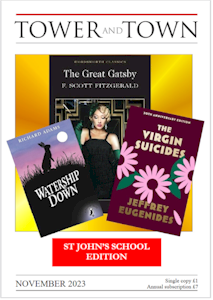

Tower and Town, November 2023 (view the full edition) (view the full edition)A Good ReadI realise that for you, dear readers, the LitFest is now a distant, happy memory but as Iím typing this †my colleagues are slumped in corners of the shop, gazing at nothing with a 1,000-yard stare, triumphant but exhausted. At this point in the year weíre pretty well booked-out, yet still they come Ė all the big titles are published in the autumn, and we read as fast as we can but itís hard not to fall behind. Which is an elaborate excuse for a November column full of plans and intentions and very little actual reviewing of Things Already Read. Please forgive. Luke Jennings talked at the festival about his new thriller, Panic, which I had on my Ďto be read when the paperback comes outí list, but which sounds so good I went mad and bought the hardback. Ten pages in, so not really able to form an opinion yet, but itís looking good so far! (Meeting him has also inspired me to re-read his memoir Blood Knots which Iíve been pressing on people for years). Talking to Simon Mason (A Killing in November and The Broken Afternoon) was fun and having asked him for his recommendations, Iíve ordered the crime novels by Peter Temple (not Paul Temple, by Francis Durbridge, remember him from the far-distant crime fiction past?) I obviously took my eye off the ball earlier in the year, because I was delighted and surprised by the arrival of Francis Spuffordís new novel Cahokia Jazz, which somehow got published and printed without my noticing. It sounds very different from Light Perpetual, which was very different from Golden Hill, but if itís as good as either of them it will be a treat which Iím looking forward to. To which Iím looking forward (grammar). I have read Rose Tremainís Absolutely and Forever, a slim little novel of first love, evocatively detailed, poignant with the knowledge brought by hindsight, gently mortifying, a lovely little book. Kassia St Clairís The Race to the Future sounds absolutely enthralling. Itís the story of a motor Ė sorry Ďautomobileí - race from Peking to Paris in 1907. Over mountains and deserts, with barely any discernible roads and even less petrol, five cars with the motleyist (?) assortment of drivers hurtled across continents, their progress breathlessly reported in one of the first global news stories. Seventy years earlier, in southern England, Isambard Kingdom Brunel, engineer, architect, designer, maverick entrepreneur and Ė shall we say Ďcomplex characterí? - was transforming transport with his railway network. Tim Bryan, director of the Brunel Institute has written Iron, Stone and Steam about the man and his successes and the odd spectacular failure. Debby Guest |